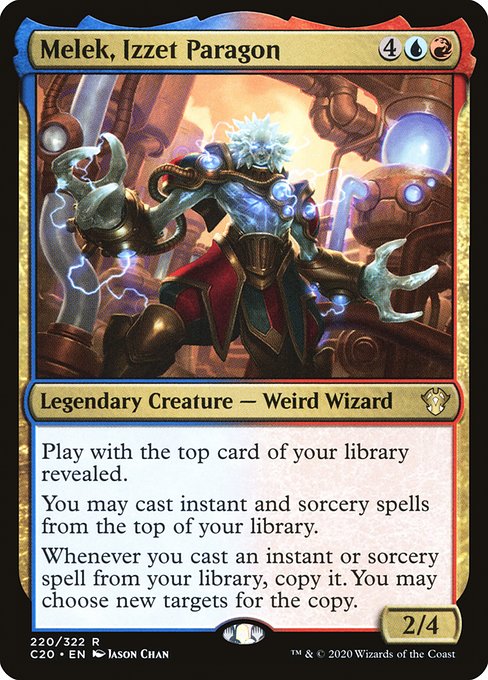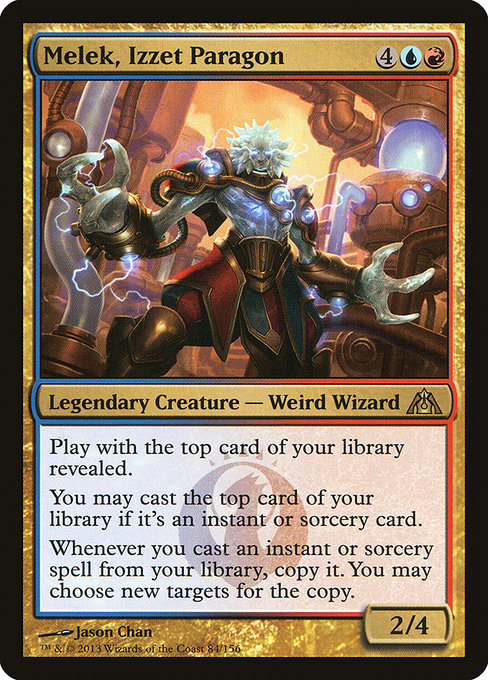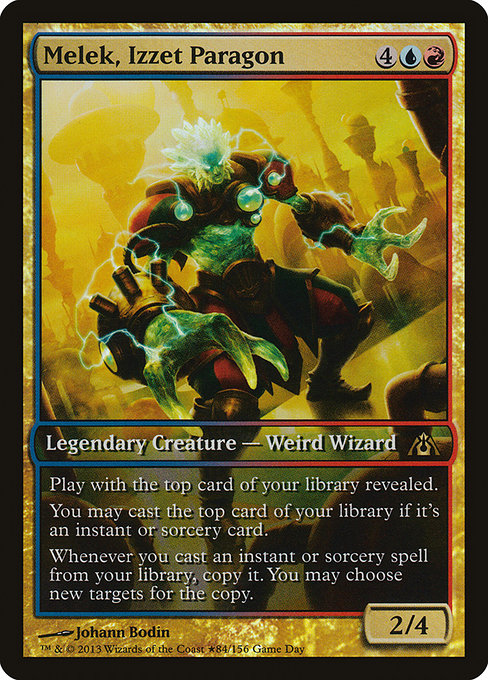standard
future
historic
gladiator
pioneer
explorer
modern
legacy
pauper
vintage
penny
commander
brawl
alchemy
paupercommander
duel
oldschool
premodern
Rulings
Melek doesn’t affect the timing rules associated with when you can cast the card. If it’s a sorcery card, you can cast it only during your main phase when the stack is empty.
You still pay all costs for that spell, including additional costs. You may also pay alternative costs, such as overload costs. Although you can’t pay additional costs for the copy that’s created, effects based on any additional costs that were paid for the original spell are copied as though those same costs were paid for the copy too. For example, if a player sacrifices a 3/3 creature to cast Fling, and you copy it, the copy of Fling will also deal 3 damage to its target.
If the spell being copied is modal (that is, it says “Choose one —” or the like), the copy will have the same mode. You can’t choose a different one.
The top card of your library isn’t in your hand, so you can’t suspend it, cycle it, discard it, or activate any of its activated abilities.
Instant and sorcery cards with miracle allow a player to cast a card immediately upon drawing it. If you cast a spell this way, you’re casting it from your hand, not your library. Melek’s ability won’t trigger.
The copy will have the same targets as the spell it’s copying unless you choose new ones. You may change any number of the targets, including all of them or none of them. If, for one of the targets, you can’t choose a new legal target, then it remains unchanged (even if the current target is illegal).
If the top card of your library changes while you’re casting a spell, playing a land, or activating an ability, the new top card won’t be revealed until you finish doing so.
When the last ability resolves, it creates a copy of the spell. You control the copy. That copy is created on the stack, so it’s not “cast.” Abilities that trigger when a player casts a spell won’t trigger. The copy will then resolve like a normal spell, after players get a chance to cast spells and activate abilities.
When playing with the top card of your library revealed, if an effect tells you to draw several cards, reveal each one before you draw it.
If the spell being copied has an X whose value was determined as it was cast (like Debt to the Deathless has), the copy has the same value of X.
Melek’s last ability will copy any instant or sorcery spell you cast from your library, not just one with targets.
You still pay all costs for that spell, including additional costs. You may also pay alternative costs, such as overload costs. Although you can’t pay additional costs for the copy that’s created, effects based on any additional costs that were paid for the original spell are copied as though those same costs were paid for the copy too. For example, if a player sacrifices a 3/3 creature to cast Fling, and you copy it, the copy of Fling will also deal 3 damage to its target.
If the spell being copied is modal (that is, it says “Choose one —” or the like), the copy will have the same mode. You can’t choose a different one.
The top card of your library isn’t in your hand, so you can’t suspend it, cycle it, discard it, or activate any of its activated abilities.
Instant and sorcery cards with miracle allow a player to cast a card immediately upon drawing it. If you cast a spell this way, you’re casting it from your hand, not your library. Melek’s ability won’t trigger.
The copy will have the same targets as the spell it’s copying unless you choose new ones. You may change any number of the targets, including all of them or none of them. If, for one of the targets, you can’t choose a new legal target, then it remains unchanged (even if the current target is illegal).
If the top card of your library changes while you’re casting a spell, playing a land, or activating an ability, the new top card won’t be revealed until you finish doing so.
When the last ability resolves, it creates a copy of the spell. You control the copy. That copy is created on the stack, so it’s not “cast.” Abilities that trigger when a player casts a spell won’t trigger. The copy will then resolve like a normal spell, after players get a chance to cast spells and activate abilities.
When playing with the top card of your library revealed, if an effect tells you to draw several cards, reveal each one before you draw it.
If the spell being copied has an X whose value was determined as it was cast (like Debt to the Deathless has), the copy has the same value of X.
Melek’s last ability will copy any instant or sorcery spell you cast from your library, not just one with targets.
Rulings
Melek doesn’t affect the timing rules associated with when you can cast the card. If it’s a sorcery card, you can cast it only during your main phase when the stack is empty.
You still pay all costs for that spell, including additional costs. You may also pay alternative costs, such as overload costs. Although you can’t pay additional costs for the copy that’s created, effects based on any additional costs that were paid for the original spell are copied as though those same costs were paid for the copy too. For example, if a player sacrifices a 3/3 creature to cast Fling, and you copy it, the copy of Fling will also deal 3 damage to its target.
If the spell being copied is modal (that is, it says “Choose one —” or the like), the copy will have the same mode. You can’t choose a different one.
The top card of your library isn’t in your hand, so you can’t suspend it, cycle it, discard it, or activate any of its activated abilities.
Instant and sorcery cards with miracle allow a player to cast a card immediately upon drawing it. If you cast a spell this way, you’re casting it from your hand, not your library. Melek’s ability won’t trigger.
The copy will have the same targets as the spell it’s copying unless you choose new ones. You may change any number of the targets, including all of them or none of them. If, for one of the targets, you can’t choose a new legal target, then it remains unchanged (even if the current target is illegal).
If the top card of your library changes while you’re casting a spell, playing a land, or activating an ability, the new top card won’t be revealed until you finish doing so.
When the last ability resolves, it creates a copy of the spell. You control the copy. That copy is created on the stack, so it’s not “cast.” Abilities that trigger when a player casts a spell won’t trigger. The copy will then resolve like a normal spell, after players get a chance to cast spells and activate abilities.
When playing with the top card of your library revealed, if an effect tells you to draw several cards, reveal each one before you draw it.
If the spell being copied has an X whose value was determined as it was cast (like Debt to the Deathless has), the copy has the same value of X.
Melek’s last ability will copy any instant or sorcery spell you cast from your library, not just one with targets.
You still pay all costs for that spell, including additional costs. You may also pay alternative costs, such as overload costs. Although you can’t pay additional costs for the copy that’s created, effects based on any additional costs that were paid for the original spell are copied as though those same costs were paid for the copy too. For example, if a player sacrifices a 3/3 creature to cast Fling, and you copy it, the copy of Fling will also deal 3 damage to its target.
If the spell being copied is modal (that is, it says “Choose one —” or the like), the copy will have the same mode. You can’t choose a different one.
The top card of your library isn’t in your hand, so you can’t suspend it, cycle it, discard it, or activate any of its activated abilities.
Instant and sorcery cards with miracle allow a player to cast a card immediately upon drawing it. If you cast a spell this way, you’re casting it from your hand, not your library. Melek’s ability won’t trigger.
The copy will have the same targets as the spell it’s copying unless you choose new ones. You may change any number of the targets, including all of them or none of them. If, for one of the targets, you can’t choose a new legal target, then it remains unchanged (even if the current target is illegal).
If the top card of your library changes while you’re casting a spell, playing a land, or activating an ability, the new top card won’t be revealed until you finish doing so.
When the last ability resolves, it creates a copy of the spell. You control the copy. That copy is created on the stack, so it’s not “cast.” Abilities that trigger when a player casts a spell won’t trigger. The copy will then resolve like a normal spell, after players get a chance to cast spells and activate abilities.
When playing with the top card of your library revealed, if an effect tells you to draw several cards, reveal each one before you draw it.
If the spell being copied has an X whose value was determined as it was cast (like Debt to the Deathless has), the copy has the same value of X.
Melek’s last ability will copy any instant or sorcery spell you cast from your library, not just one with targets.
Your collection? Your decks?
Want to manage your collection and/or create decks?
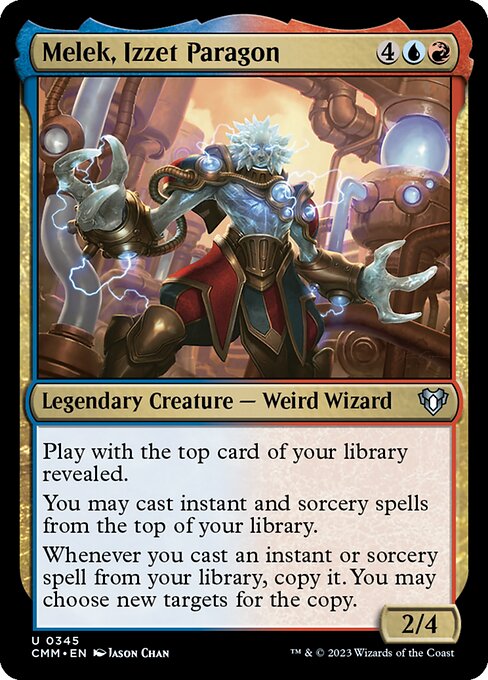

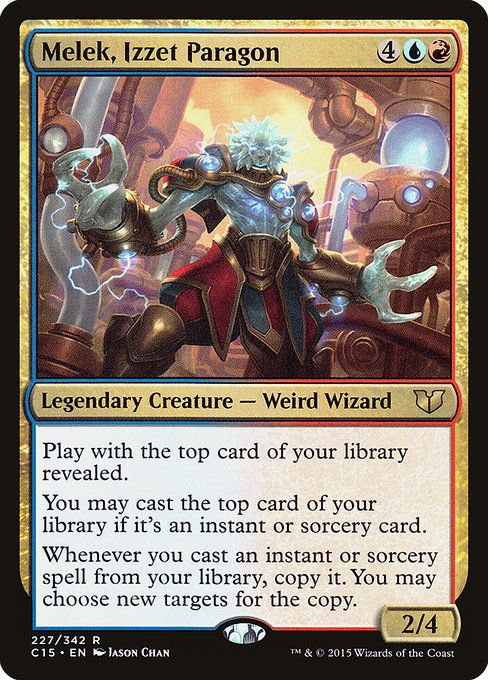
 0
0
 0.34€
0.34€
